Everything you need to know about Apple's heated battle with the FBI over the locked San Bernardino iPhone
September 2014: Apple seriously upgrades the iPhone's encryption systems as part of a software update. Before, parts of iPhone data were encrypted, such as emails and calendar data. But the iOS 8 software update put much more of the interesting data under lock and key, including text messages, photos, and contacts.

September 2014: Almost immediately, law enforcement officials react. FBI Director James Comey and Manhattan District Attorney Cyrus Vance criticize Apple within weeks of the iOS 8 update. Those two officials remain among the most outspoken Apple critics on the topic of encryption.
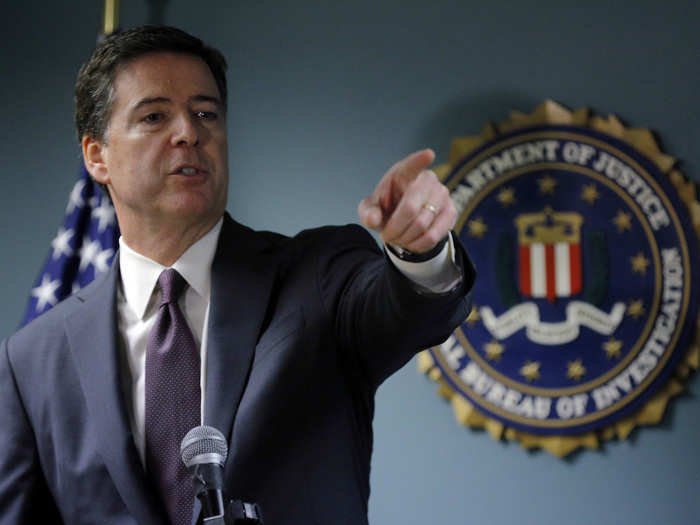
“There will come a day when it will matter a great deal to the lives of people . . . that we will be able to gain access” to such devices, Comey said just days after Apple turned on its improved iOS security.
Even then-Attorney General Eric Holder weighed in. “It is fully possible to permit law enforcement to do its job while still adequately protecting personal privacy. When a child is in danger, law enforcement needs to be able to take every legally available step to quickly find and protect the child and to stop those that abuse children. It is worrisome to see companies thwarting our ability to do so,” he said at a conference on child sexual abuse less than a month after Apple turned on full-disk encryption by default.
October 2014: Google appears as if it will back up Apple and turn on full-disk encryption by default on Android phones, but then it quietly backs away.
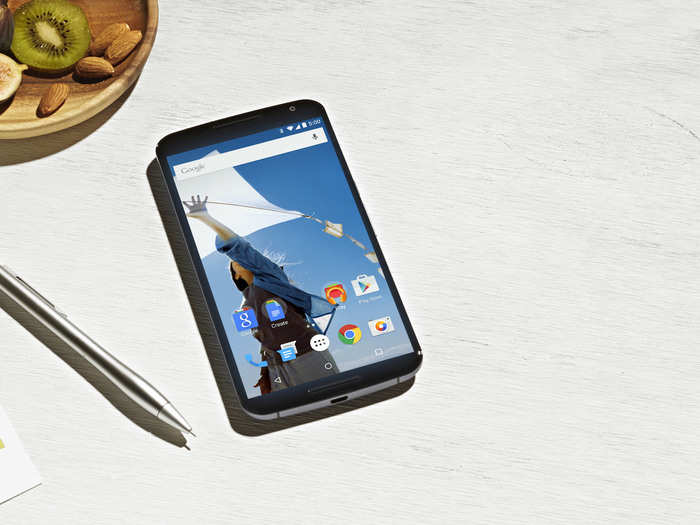
Part of the reason why Google can't turn on full-disk encryption is twofold: first, it's up to the actual phone manufacturer whether to turn it on by default, and second, Android updates trickle out to users much more slowly than Apple updates.
December 2, 2015: Two terrorists burst into a government building in San Bernardino, California, killing 14 and injuring 22 in what has become one of the most high-profile terrorism cases in the past decade.
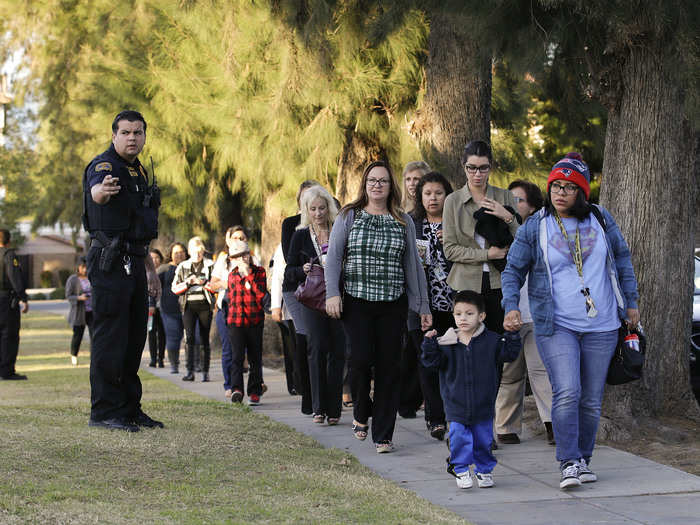
December 3, 2014: The FBI starts investigating the San Bernardino case. The shooters, Syed Rizwan Farook and Tashfeen Malik, crushed their personal phones. But Farook had a government-issued iPhone 5C so that he could perform his job as a health inspector.
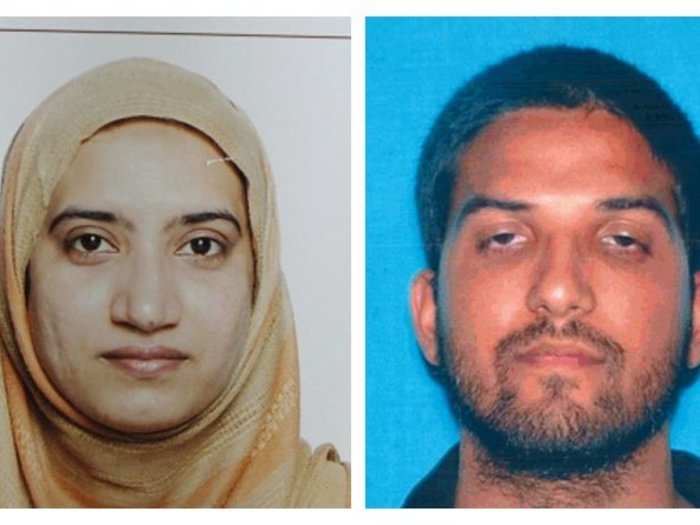
December 2014: Farook's iPhone 5C running the most recent version of iOS made full iCloud backups, which were obtained by the investigation, but there was a gap of a few months between the last backup and when the phone was obtained.
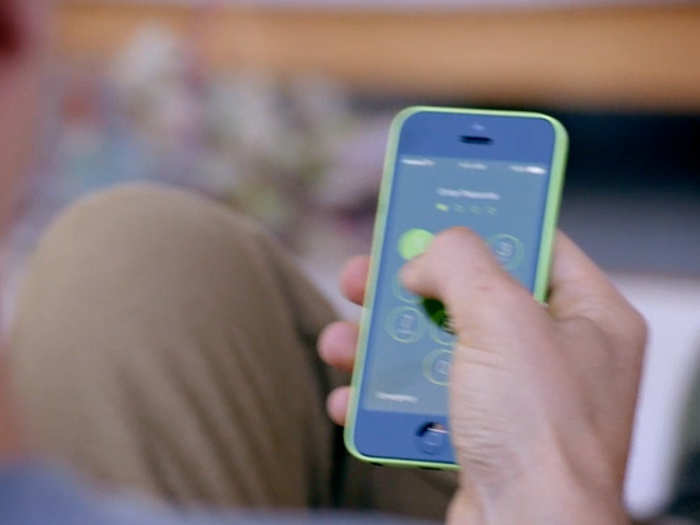
February 16, 2016: Sheri Pym, a federal judge in California, publicly orders Apple to assist the FBI to help it crack Syed Farook's iPhone. Specifically, it says it wants Apple to create custom software that would mean the phone would not wipe itself after 10 failed passcode attempts.
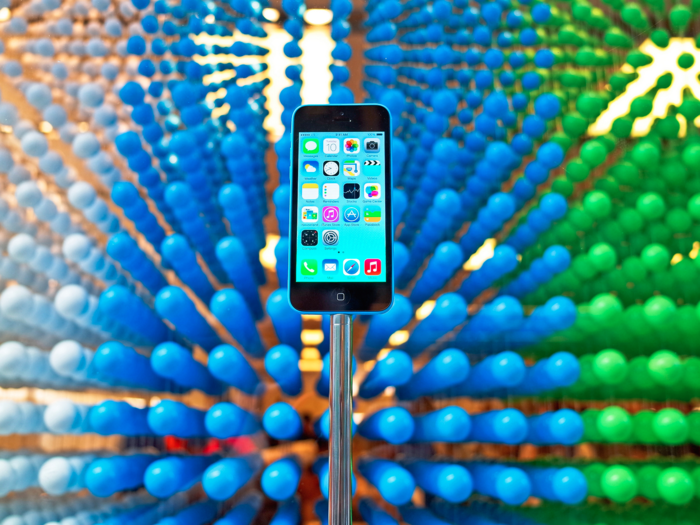
In fact, photos found on Farook's work iPhone may have been the reason that several high schools were evacuated after the shooting.
February 17, 2016: Apple springs into action, even though, according to CEO Tim Cook, it only learned about the court order from the press. After huddling with his top legal advisors, within 24 hours of the order, CEO Tim Cook posts an open letter to Apple customers on the front page of Apple.com, explaining Apple's approach to encryption and why the company opposes the FBI order to create a "backdoor."

You can read the full letter here.
February 17, 2016: In the days after Cook posted his open letter, a few Silicon Valley executives start publicly backing Apple. Notably, Google CEO Sundar Pichai backed Apple in a series of tweets.
https://twitter.com/mims/statuses/700104298600886272
1/5 Important post by @tim_cook. Forcing companies to enable hacking could compromise users’ privacy
https://twitter.com/mims/statuses/700104342720761856
2/5 We know that law enforcement and intelligence agencies face significant challenges in protecting the public against crime and terrorism
https://twitter.com/mims/statuses/700104383762026496
3/5 We build secure products to keep your information safe and we give law enforcement access to data based on valid legal orders
https://twitter.com/mims/statuses/700104433183502336
4/5 But that’s wholly different than requiring companies to enable hacking of customer devices & data. Could be a troubling precedent
https://twitter.com/mims/statuses/700104478360342528
5/5 Looking forward to a thoughtful and open discussion on this important issue
February 19, 2016: The Justice Department files a motion against Apple accusing it of refusing to unlock the phone as part of its "public brand marketing strategy" instead of a legal or moral rationale.
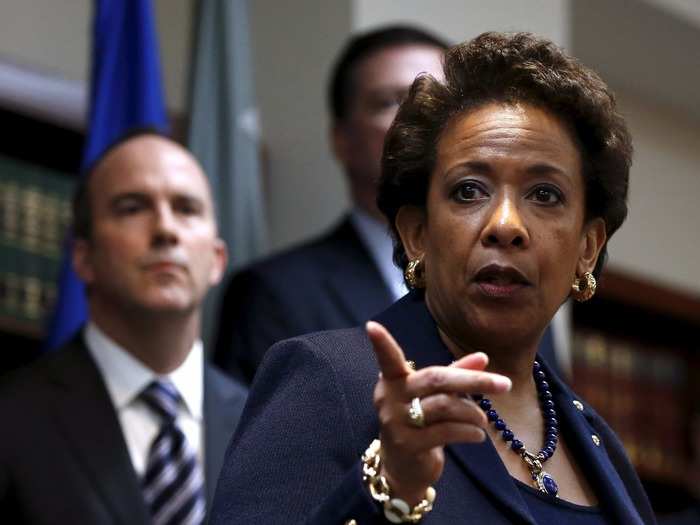
"Do we let one company, no matter how great the company, no matter how beautiful their devices, decide this issue for all of us?” Current Attorney General Loretta Lynch said recently.
February 19, 2016: A senior Apple executive speaking on the condition of anonymity tells reporters that the custom software the FBI is requesting would work on other iPhones, and highlights the fact that law enforcement may have screwed up the investigation by resetting the phone's iCloud password. The executive signals that Apple will continue to build even more privacy-protecting user security into its devices.
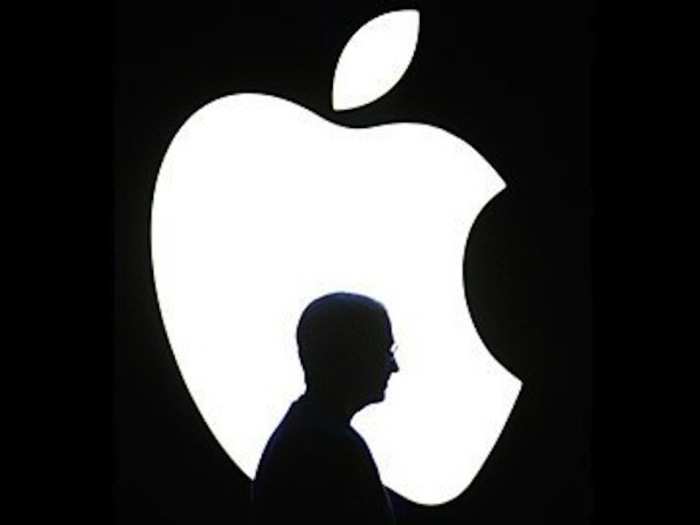
February 20, 2016: The FBI is forced to release a statement confirming that it had ordered the investigation to reset the iCloud password on the shooter's iPhone.
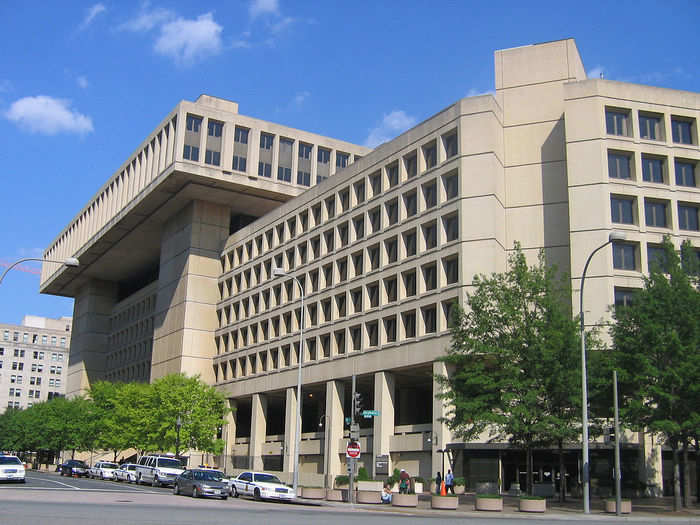
"Since the iPhone 5C was locked when investigators seized it during the lawful search on December 3rd, a logical next step was to obtain access to iCloud backups for the phone in order to obtain evidence related to the investigation in the days following the attack," the FBI's statement read. "The FBI worked with San Bernardino County to reset the iCloud password on December 6th, as the county owned the account and was able to reset the password in order to provide immediate access to the iCloud backup data."
Full story here.
February 21, 2016: FBI Director Comey lays out his rationale for Apple to unlock Farook's iPhone in a opinion posted on the Lawfare blog.
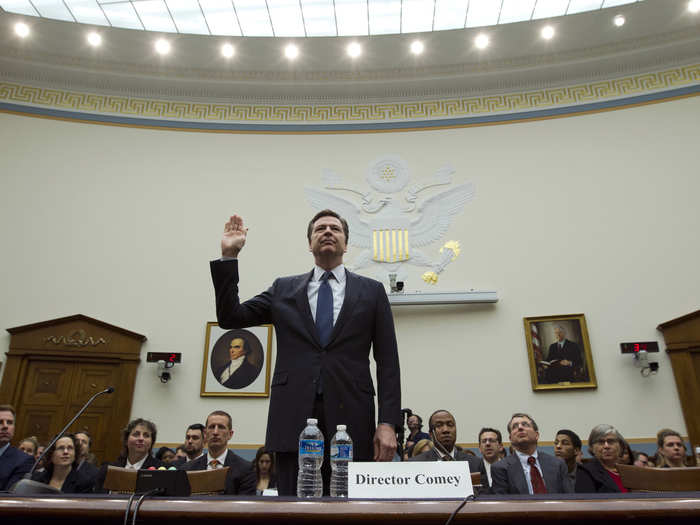
His full post, "We Could Not Look the Survivors in the Eye if We Did Not Follow this Lead," is here.
"The San Bernardino litigation isn't about trying to set a precedent or send any kind of message. It is about the victims and justice. Fourteen people were slaughtered and many more had their lives and bodies ruined. We owe them a thorough and professional investigation under law. That's what this is. The American people should expect nothing less from the FBI," Comey wrote.
February 22, 2016: Apple posts an FAQ on its website that suggests that the company is planning to make its encryption even stronger going forward.
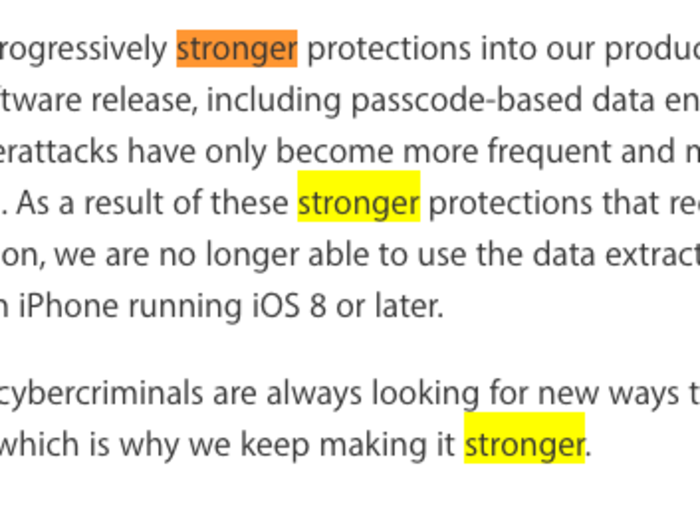
The full FAQ is available here.
February 22, 2016: The American public is polled about the issue by Pew Research Center, revealing that 51% of respondents side with the FBI and think that Apple should comply with the court order.

More information from the poll here.
February 24, 2016: CEO Tim Cook breaks his silence and gives an extended interview with ABC where he calls the custom technical assistance the FBI wants "the software equivalent of cancer."

February 25, 2016: Apple files its official legal response to the FBI. The document is written clearly and is meant to persuade a larger audience, according to senior Apple executives.
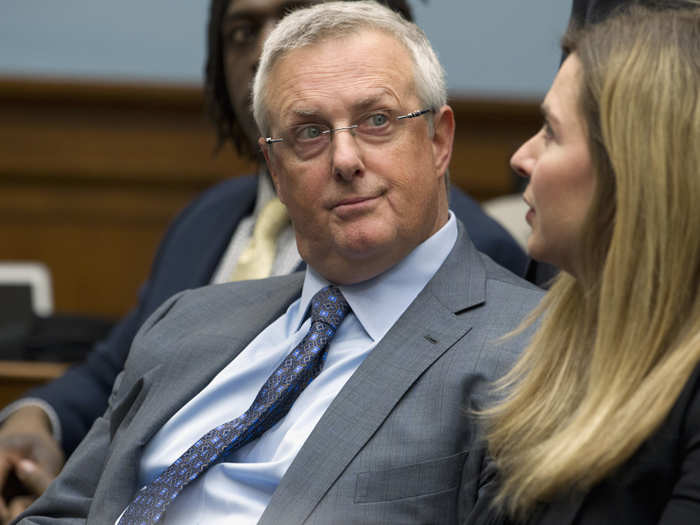
Apple general counsel Bruce Sewell is leading Apple's legal, which includes big-time outside help, including Ted Olson, a top-tier litigator who argued against Proposition 8 in California, and Marc Zwillinger, one of the top information security lawyers in the world.
March 1, 2016: Finally, the showdown heads to Capitol Hill. Congressmen from both sides of the aisle grill FBI Director James Comey over the FBI's court order, and later press Apple's lawyer Bruce Sewell over what he would like an encryption law to look like.
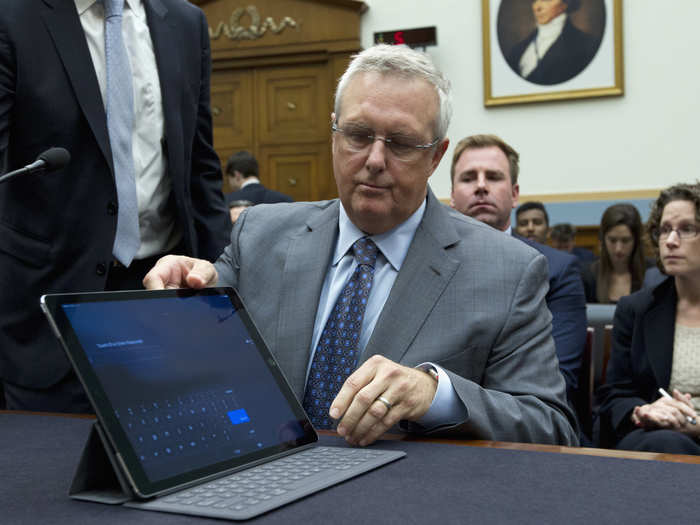
In general, the representatives on the Judiciary Committee, which held the hearing, were skeptical of Comey's arguments, and a good deal more receptive to Sewell's statement.
It looks like aside from its legal battle, Apple will soon have to convince Congress to pass what it believes an encryption backdoor law should be.
Apple and the FBI will face off in court again on March 22.
Popular Right Now
Popular Keywords
- India’s wearables market decline
- Vivo V40 Pro vs OnePlus 12R
- Nothing Phone (2a) Plus vs OnePlus Nord 4
- Upcoming smartphones launching in August
- Nothing Phone (2a) review
- Current Location in Google
- Hide Whatsapp Messages
- Phone is hacked or not
- Whatsapp Deleted Messages
- Download photos from Whatsapp
- Instagram Messages
- How to lock facebook profile
- Android 14
- Unfollowed on Instagram
Advertisement